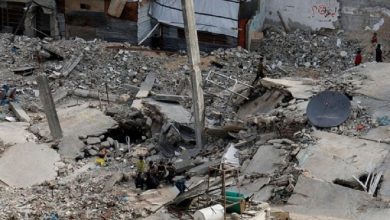American Plan to Marginalize Hamas: Facing Insurmountable Obstacles

Watan-The Israeli newspaper “Haaretz” published an article by writer Nabhan Khreishi, in which he affirmed that the American plan aimed at marginalizing the Palestinian resistance movement, Hamas, after the end of the war in Gaza, is doomed to fail due to three main obstacles.
Khreishi stated that according to the American plan, Washington intends to revitalize the Palestinian Authority in Ramallah and legitimize it to prepare it for governing the West Bank and Gaza after the war.
In what seems to be a preparation for the implementation of the American plan, Palestinian Prime Minister Mohammed Shtayyeh recently announced the first phase of extensive reforms in his government, according to the newspaper.
A secret meeting was also held recently with senior Saudi, Egyptian, Jordanian, and Palestinian national security officials, where they discussed how to make the American plan feasible.
However, Khreishi clarified that this plan faces three main obstacles, foremost among them being the possible procrastination by Israeli Prime Minister Benjamin Netanyahu in implementing it and Israel’s failure to defeat the Hamas movement, as well as the possibility of the death of Palestinian President Mahmoud Abbas or his illness hindering him from performing his duties.
Netanyahu’s Obstacle
The writer explained that Israeli Prime Minister Benjamin Netanyahu has declared more than once his refusal to allow the Palestinian Authority to return to managing and governing the Gaza Strip. He pointed out that over the past 17 years, mostly under Netanyahu’s watch, Israel has continuously worked to obstruct the political reunification between Gaza and the West Bank, preferring a divided and weaker leadership.
If the current U.S. administration pressures Netanyahu to respond to its plan to rehabilitate the Palestinian Authority, it is likely, according to the writer, that Netanyahu will procrastinate until the end of the U.S. presidential elections in November 2024, hoping that the elections will remove current President Biden and bring his Republican opponent, Donald Trump, to power.

Failure of the Israeli Occupation Army
The second obstacle facing the American plan, according to the writer, lies in the highly likely scenario of Israel not achieving victory in the current war in Gaza and Hamas continuing its political and military presence in the region.
He noted that nearly four months after the war, Israel’s declared objectives – after the “Operation Quake of Al-Aqsa” on October 7th – of eliminating Hamas have not been achieved. Hamas continues to fight and negotiate with Israel regarding prisoner exchanges.
The writer stated, “Even if we assume that Hamas has been militarily weakened, the truth is that it will remain a prominent political player on both the local and regional fronts, just as the Palestine Liberation Organization did after disarming in the 1982 Lebanon war.”
In a recent public opinion poll conducted by the Palestinian Center for Policy and Survey Research, approximately 90% of respondents supported the nomination of Palestinian Authority President Mahmoud Abbas, while 60% called for dismantling the Palestinian Authority itself.
However, the United States still supports the Palestinian Authority but with efforts to renew its legitimacy. Even if this effort succeeds, the new version of the Palestinian Authority is unlikely to be sustainable.
The writer pointed out that Fatah, along with active Arab states in Palestinian affairs and the United States, will not risk holding presidential and legislative elections in the West Bank and Gaza Strip because Hamas, which will remain a major force in local politics, is likely to win.
He mentioned that Hamas enjoys great popularity among Palestinians due to its strong resistance against the occupation army in the battles of Gaza.
Abbas’ Death
A third obstacle, according to the writer, that must be taken into account is that Washington’s attempt to rescue the sinking Palestinian Authority will not last if Palestinian President Mahmoud Abbas dies or becomes too ill to perform his duties.
He explained that Fatah suffers from deep crises and competition among its top leaders for Abbas’s succession, with tensions so high that the struggle for power within the authority may even lead to internal armed conflict.
In such a scenario, Hamas, with its overwhelming popularity after the war in Gaza, would fill the void.

The writer said, “It is also important to note that America presented that plan when it became clear that Arab countries were not planning to help manage Gaza after the war.”
The Biden administration, which is seeking reelection, hopes to reassure Arab and Muslim voters in the United States that it is working to ensure that Israel does not permanently occupy the Gaza Strip.
The writer concluded, “Hamas will reject any plan in which it is not a party, and it is likely to ally with leaders who have split from Fatah, such as Mohammed Dahlan and Nasser al-Qudwa, to form a post-war entity that may not be officially part of it, but will remain influential as its driving force.”






